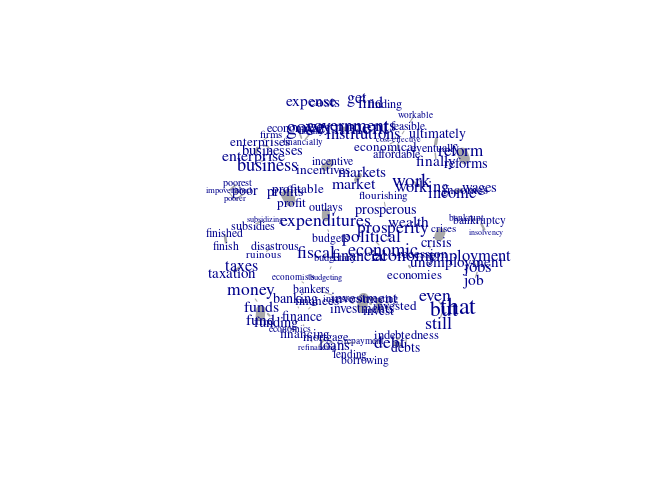CAVA is an R package to assit in working with dictionary (keywords/lexical text analysis) in a valid way. It allows you to use an embeddings model to do dictionary expansion/augmentation, check its coherence, (and at some future date) validation and analysis.
For a longer description, see our ICA Tool Demo abstract.
You can install CAVA from github:
remotes::install_github("vanatteveldt/CAVA")Before starting, you need an embeddings model. Currently, we only support Fasttext .bin models. The code below downloads an English fasttext model:
if (!file.exists("cc.en.300.bin")) {
url = "https://dl.fbaipublicfiles.com/fasttext/vectors-crawl/cc.en.300.bin.gz"
options(timeout=4300) # assuming 1Mb/s
download.file(paste0(url), destfile = "cc.en.300.bin.gz")
R.utils::gunzip("cc.en.300.bin.gz") # Install R.utils if needed
}The main functions exposed to cava are shown below. For a more elaborate example, please see the example usage file.
Loading the FastText mnodel, using the state of the union speeches as target corpus:
library(CAVA)
corpus = quanteda::corpus(sotu::sotu_text, docvars = sotu::sotu_meta)
vectors = load_fasttext("cc.en.300.bin", corpus)Expanding a dictionary using wildcard and similarity:
dictionary = c("fin*", "eco*")
dictionary = expand_wildcards(dictionary, vectors)
candidates = similar_words(dictionary, vectors)
dictionary = c(dictionary, candidates$word[candidates$similarity>.4])
head(candidates)| word | similarity |
|---|---|
| investment | 0.5263631 |
| investments | 0.5070851 |
| monetary | 0.5067791 |
| money | 0.5034836 |
| ultimately | 0.4815412 |
| profitable | 0.4813354 |
Expanding a dictionary using antonyms:
positive = c("good", "nice", "best", "happy")
negative = c("evil", "nasty", "worst", "bad", "unhappy")
candidates = similar_words(positive, vectors, antonyms = negative)
head(candidates)| word | similarity |
|---|---|
| great | 0.6968333 |
| better | 0.6371742 |
| decent | 0.6344477 |
| excellent | 0.6282948 |
| wonderful | 0.6057519 |
| perfect | 0.6032647 |
Computing and plotting pairwise similarities:
similarities = pairwise_similarities(dictionary, vectors)
similarities |> similarity_graph(max_edges=100) |> plot()Computing similarity to dictionary centroid (sorted with most distances words on top):
similarity_to_centroid(dictionary, vectors) |> head()| word | similarity |
|---|---|
| finished | 0.1932090 |
| finish | 0.2300643 |
| findings | 0.2401340 |
| finest | 0.2455174 |
| fine | 0.2593122 |
| finds | 0.2703327 |
